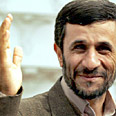
One story isn't enough
Israel should not address Iranian nuke threat based on 1938 realities
When there's complete agreement regarding the interpretation of reality, the ways of addressing this reality are minimized. If we're talking about interpretation that has existential implications, the adoption of a conception and the minimization of options are a highly dangerous process.
This is the case in all matters related to the Iranian nuclear program. We are exposed to one and only story, the story of the Holocaust: Ahmadinejad, in the role of Hitler, wants to exterminate the Jews, while Europe and the world stand on the sidelines.
Benjamin Netanyahu represented this approach in the most blatant manner when he said: "The year is 1938 and Iran is Germany." Netanyahu's words imply that those who seek solutions through agreements and not through war are like Chamberlain, while Netanyahu himself apparently intends to play the role of Winston Churchill.
Is our situation indeed similar to that of European Jews in 1938? Certainly not. The Holocaust narrative holds immense power in our collective perception and the manner in which politicians make use of it is dangerous. The Holocaust and imagery associated with it arouse serious existential anxiety alongside deep fear of helplessness in the face of those who wish to exterminate us.
The comparison between Ahmadinejad and Hitler is arousing the fear of again being a victim and kindles the desire to attack, even if only to show that we are not helpless again. This mechanism is so powerful that it undermines our thinking ability and the ability to distinguish between the state of European Jews in 1938 and the State of Israel's situation vis-à-vis Iran.
We are entering an increasingly narrow path where instead of responding to the realities of the Middle East as they are in 2006 we'll attempt to fix the trauma of 1938.
Different angle
The characteristics of the "attack or flee" mechanism we're adopting can already be seen at this time, as the only two possibilities we are presented with are a pre-emptive strike on Iran or fleeing the country (as predicted by Knesset Member Ephraim Sneh.) The desire to ameliorate the pains of the past may lead us to seek the fears of the past within current realities instead of seeking new ways to handle the reality that are suitable for today's world.
The possibilities at our disposal are not only ignoring the threat or a preventative strike. This dichotomy is much more dangerous because of our leadership's weakness. In Israel, weak leadership embarks on war more easily. Only a confident Israeli leader can resist the temptation of using force.
Iran is described as a one-dimensional entity completely identified with President Ahmadinejad, and there's overwhelming agreement that if it possessed nuclear weapons it would use them against Israel.
An article recently published by the Herald Tribune described realities in Iran from a completely different angle. According to the reporter, the government is concerned mostly with the question of maintaining Iran's religious regime in the face of the young generation's distancing from Islam and its attraction to Western culture.
The one-dimensional description accepted by the Israeli public makes it impossible to understand the complex picture. Because of the Holocaust conception, many questions are not addressed. For example, how are decisions taken in Iran? Who decides? Is it even possible to prevent the Middle East's nuclearization, or should we switch our way of thinking and find different ways to address the new reality?
Those who adopted the Holocaust conception are uninterested in such questions, because they already know all the answers. The problem is that those answers are based on the world of 1938.
Amnon Toledano is a psychologist and management consultant










